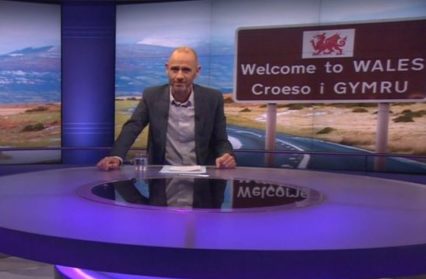Gary Raymond asks if the BBC is so continuously disrespectful to Wales, why do we continue to look up to it?
Apparently there is a debate going on about the role of the Welsh language in public life in Wales. In England. That’s right. In Wales, this subject is done. Settled. Has been for a long time. We’re all on board in one form or another. We may debate expenditure, nuance, the nips and tucks of politics, but only the very coarse or the very stupid do not see the Welsh language as perhaps the most beautiful thing about Wales, that it enriches us, and that it strengthens us from the roots of our heritage to the blossoming of our children. And the only time this debate tends to raise its head with any degree of prominence anywhere nowadays is when the English raise it.
There has been a furore over the disrespectful way BBC’s Newsnight debated the subject this week. There is a petition (of course) demanding an apology from the BBC. Fight these fights. Push back and plant a flag when you get as far as you can get. I’m all for that. But as a strategy, is the ongoing battle between the people of Wales and the BBC actually returning any results? Are we as a nation and as a people, on the receiving end of more intelligent, mature, informed debate in UK-wide coverage? Are we being treated with more respect? There are experts better placed than me to answer that question, but it feels even when the BBC heads promise investment in Welsh programming and representations of Welsh life, that what we smell coming is nothing new.
Perhaps it is time to start thinking of a new approach.
Newsnight may well apologise, but what will they be apologising for? Being disrespectful to the people of Wales? This is to take this week’s programme out of context. The BBC is losing its grip in every quarter, and the rapidly diminishing quality of its debate programmes is not a problem the people of Wales are alone in feeling the effects of.
Okay, so look at the quality of the commentators Newsnight decided to drag on for its bottom-feeding debate, initiated itself by the row sparked by Sports Direct’s rather colonial and probably unlawful diktat a few weeks ago, to ban its staff in North Wales from speaking Welsh at work. With all due respect to Ruth Dawson, these were not top line figures for a debate on this subject.
But it’s important to understand that this is part of a pattern with Newsnight since Ian Katz became its editor in 2013, a man who said shortly after taking the position, in response to criticism, that so few women appeared as commentators on Newsnight because so few wanted to go on. Much more recently, BBC’s nightly flagship current affairs programme has welcomed on Sebastian v. Gorka, an advisor to Donald Trump who bought his doctorate from a passing caravan of Victorian gypsies, and in one interview after Trump’s electoral victory, wore the pin badge of the Order of Vitez, a Hungarian Nazi group banned by the UN. Newsnight has a poor record when it comes to the credibility of its guests on many subjects, not just Wales. This is just a shining example of Newsnight being unable to mount a serious debate (or perhaps it is an example of Newsnight making a nonsense debate look quite serious). And don’t even get me started on the sesspool that Radio Four’s Today Programme has become. There has been a witty meme circulating for some time, illustrating the qualifications of two sides of a climate change debate, made in response to one Today Programme segment (professor Julia Slingo, chief scientist at the Met Office, versus Nigella Lawson’s dad).
The issue here then is bigger than Newsnight, and it’s bigger than the Today programme. The issue is why does Wales constantly look to the BBC for succour? Surely we have tried this. Surely we have argued and begged and debated until we are blue in the face. Perhaps it is time for formidable figures who have Wales’ interests at heart to start debating how we can, as a nation, do things without the BBC.
Perhaps the final word here should go to Professor Laura McAllister of the Wales Governance Centre (and somebody I’m sure who would have been an excellent guest on the Newsnight debate), who pointed out in her blog on this matter:
Wales has plenty of successful people placed across the UK media, in a range of different roles in news, politics, sport, arts and other spheres. It seems fair to conclude that their collective influence is indiscernible in terms of generating a respectful and informed approach to covering Wales in the media.
Editorial Note:
Wales Arts Review commissions and publishes content predominantly in the English language, yet it proudly acknowledges that Wales is a bilingual nation with a richly diverse bilingual culture. We therefore do not restrict our focus to arts and literature delivered only in the medium of English. In our five years, we have published many reviews and articles examining works by Welsh language artists and companies; from the work of Theatr Genedlaethol Cymru to TV hit crime-thriller Y Gwyll. We have also covered different aspects of the National Eisteddfod every year since we launched in 2012, and were proud to announce that the winner of our 2014 ‘Greatest Welsh Novel’ prize was Caradog Prichard’s Un Nos Ola Leaud. Wales Arts Review looks forward to working with partner organisations and Welsh language writers and critics on future projects that critically evaluate and celebrate all the languages of Wales.



 Enjoyed this article? Support our writers directly by buying them a coffee and clicking this link.
Enjoyed this article? Support our writers directly by buying them a coffee and clicking this link.







